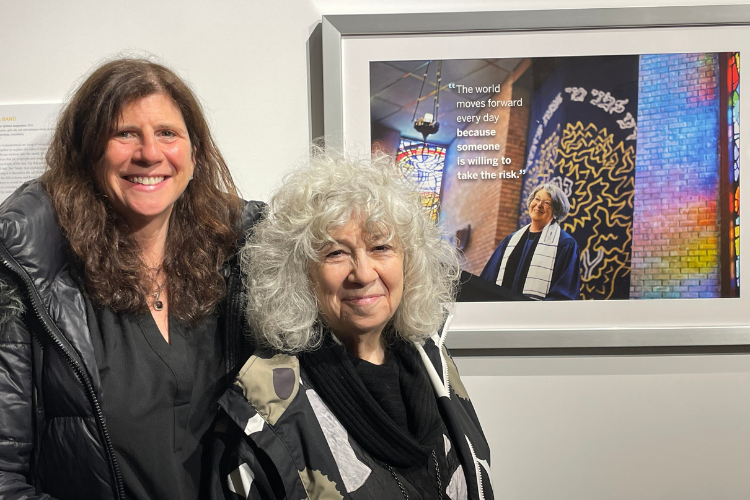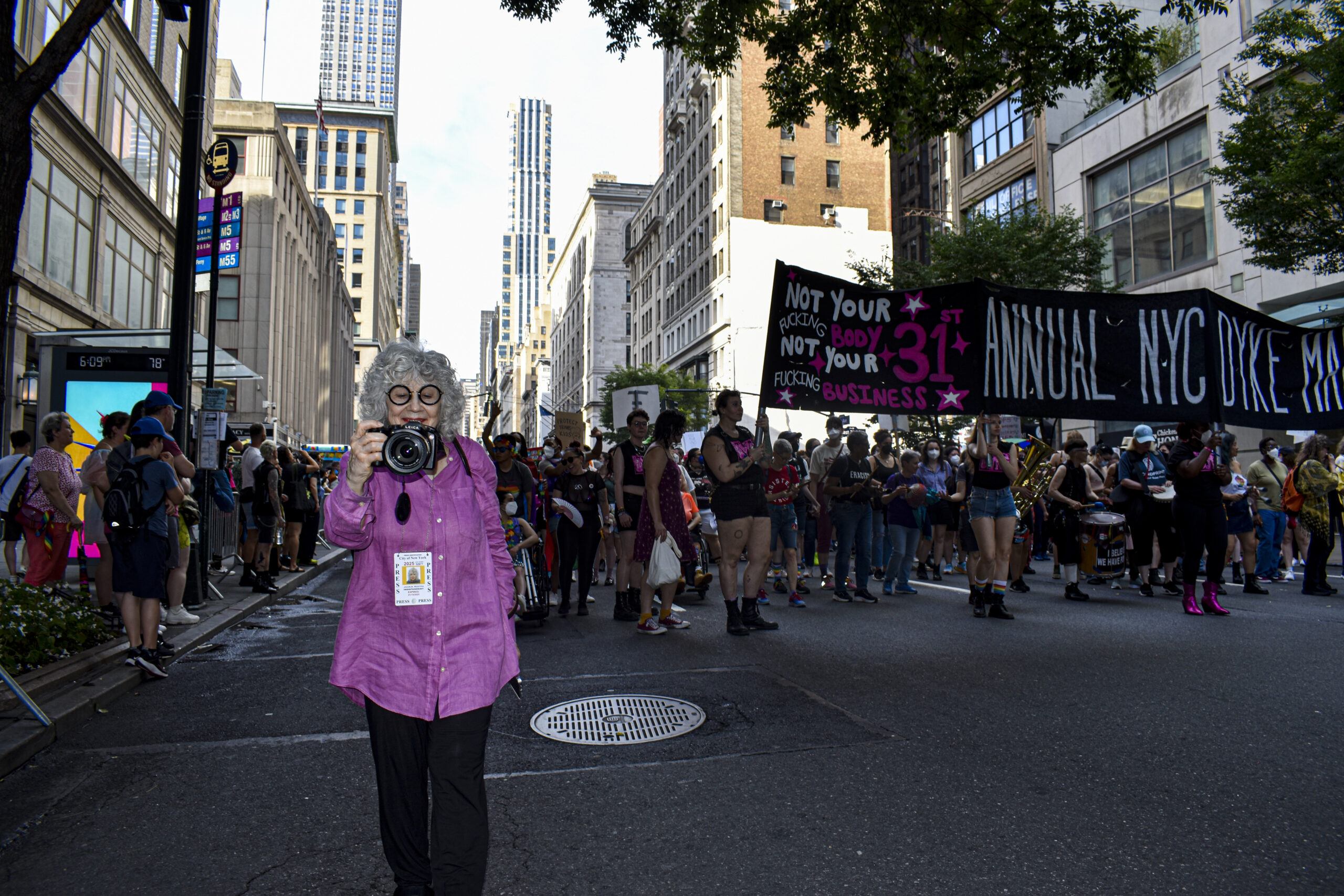
Joan Roth’s Photography, Onscreen
Joan Roth should be considered a national treasure and at Lilith, that just what she is. Roth has been Lilith’s go-to photographer for decades and now, A Feminist Lens: The Art & Activism of Photographer, 28 minute documentary produced by her daughter Melanie Roth Gorelick and directed by Pamela French, we get an intimate portrait that focuses of five decades of her career. Gorelick talks to Fiction Editor Yona Zeldis McDonough about what it was like growing up with a living legend.
Yona Zeldis McDonough: Why make a film about your mom and why do it now?
Melanie Roth Gorelick: I wrote and produced A Feminist Lens: Art & Activism of Photographer Joan Roth for my mother’s 80th birthday last August. My mother had dedicated the last 50 years to her artistic craft, using her camera as an advocacy tool and a pioneer making women visible, with a special focus on the diversity of Jewish women around the world.
I lived with my mom during COVID and this was a COVID project, a labor of love. Although I lived in New Jersey where I raised my daughters for almost 19 years, I moved in with my mother a year before COVID having taken a new job in New York. I believe it was bashert. It was supposed to be temporary. Instead we bunkered down only going out infrequently for a couple of years during the pandemic and I began to formulate my idea for a legacy project honoring my mother’s work and impact on Jewish women’s activism and to inspire people – especially the younger generation and those on the frontlines working for abortion access, ending barriers to education, re-writing of our history, and the targeting of LGBTQ community.
As Gloria Steinem said in the movie, pictures remind each of us that we are not alone but there are millions of us – the majority – working for gender justice in the US and around the world. My mother’s pictures have captured this and shouldn’t remain in her boxes but should be shared with the world.

Photograph by Sivan Ellman, Lilith 2023 Intern
YZM: How did your mother’s work influence your own career choices?
MRG: My mother’s photography focused on women’s rights and life as a single mother influenced my career choices. Since I graduated from college I have worked on gender justice and social justice causes professionally. My mother instilled in me the importance of sharing our Jewish values of Tikkun Olam and to break the barriers for women to live as equal citizens throughout the world. She also shared the importance of making visible women’s lives and experiences be it in the home making challah and raising children, in the workplace, or advocating to change laws and policy. Once we give importance to women of all ages, colors, and creeds, we bring them into the conversation especially when we are working to better the lives of all people.
As the daughter of a single mother in the 70s and 80s I both experienced the impact of the discrimination women faced and also saw how change is made and how the empowerment of women changes society for all people. In the 1980s, when I was in college, we both became interested in international women’s issues and involved in Jewish life. I went on to work for the American Association of University Women, UN Development Fund for Women (now UN Women), founded the NJ Coalition Against Human Trafficking and led the Jewish community relations field working for a just and pluralistic Society for over 17 years. She traveled around the world making Jewish women visible and then supported the advancement of many new Jewish women’s organizations that were created in the US throughout the 1990s and beyond.
I am currently taking on the CEO position at Elluminate, an amazing organization that is working for social change and gender justice by supporting Jewish women social justice entrepreneurs.
YZM: Have the subjects she’s tackled changed over the years and if so, why?
MRG: The film depicts the main areas of Joan’s work and her photographic journey. For me that is the personal, political and spiritual journey that shaped her life in that order. Her overall collection and story can be found on her website www.joanroth.com. The three major areas of her work that are focused on in the film include the following:
Homeless Women – When Joan began her photographic career in the early 70’s, she used her camera to advocate for shopping bag ladies living on the streets of New York, there were no shelters or food kitchens for women, and the city government denied there was a problem. My mother decided to make them visible and for several years photographed them, befriended them, and learned their stories. She put together her first book “Shopping Bag Ladies of New York” and worked with the City to do a study that resulted in supporting this population and creating shelters. Several years later, she met a new crop of homeless women living in Central Park but they knew which day they could eat or shower in different places. Her work on Maggie and Marcia, showed a new manifestation of homelessness in the City. Joan continues to be an advocate for homeless women in New York and goes to Albany to lobby each year and shows up on the front lines of housing activist efforts.
Women’s Movement – Joan has been documenting the women’s movement starting with the second wave of feminism in the 1970s which began where we lived in New York and when she was getting divorced. Her pictures follow many of the leaders and women who wrote about women’s lives and empowerment or activated women to mobilize for change. This work took her to DC and to attend the UN End Decade World Conference on Women in Kenya and the Fourth World Conference on Women in Beijing. She continues to document women’s activism until today.
Jewish Women Around the World – Joan is most well known and passionate about illuminating the lives and diversity of Jewish Women. In the 1980s she began her own spiritual journal becoming more involved in living a Jewish life and the Jewish community. She began this journey in Ethiopia documenting how the Jewish Ethiopian community lived indigenously prior to them leaving for Israel. She went on to travel the world including into the former soviet union when the wall fell, Morocco, Yemen, India, and other places photographing women’s lives resulting in the coffee table book “Jewish Women: A World of Tradition and Change.” This book and companion exhibit has been circulating internationally for over two decades. Joan continued to photograph Jewish women until today, especially in the US, Israel, and Eastern Europe.
Women Rabbis – most recently Joan has been photographing women rabbis. Her portrait of the first woman rabbi Sally Priseand to be ordained in the US is now part of the permanent collection of the National Portrait Gallery in Washington DC.
YZM: What do you see as the lasting impact of her work?
MRG: I was recently on a special trip to Berlin along with other Remembrance workers that focus on the Holocaust and civil rights in America with an organization called Widening the Circle. I realized from that experience that this is what my mother’s work is about. Her photographs record the history, effort and experiences of Jewish women at home and abroad taken from a gender lens during different time periods. She not only takes pictures but she gets to know her subjects. Some of them have included Holocaust Survivors in the Ukraine who survived Baba Yar and a Rebbetzin from Ethiopia who didn’t know if she would make it to Israel but wanted to be remembered. In the future it is her pictures that will be the record of women’s lives and experiences.
We have already seen that the most recent people seeking out her work are those working with the Sephardic community who are interested in sharing with the younger generations how Jews lived in “vanishing” communities. An effort has been made by the Sephardic Federation on this and my mother’s work was showcased at two conferences on North African Jewry which focused on remembering, revitalizing and restoring Jewish life in several of those countries.
YZM: You’ve said that there could be another film made about her; what did you leave out in this film that you would include in the next?
MRG: There is a great interest from those who watch the movie to make it longer and show more of her work. This is definitely under consideration. My hope is to continue to tell the stories of the women she met around the world who risked their lives to travel to Israel and whose children are now Israelis. I have recently launched the Making Women Visible: Joan Roth Legacy Project. The aim is to preserve her work and ensure her collection has a good home, to continue to share her stories and work though publications, film, exhibits, and storytelling opportunities, and to create new opportunities to make women visible. We are looking for significant donors interested in supporting this effort — we see it as an entrepreneurial start-up needing the support to have a financial runway from the to make the project successful. With the culture war on women making gains, we believe that her photographs will inspire all of us to keep on working for women’s equality, reproductive rights, and gender justice.
Learn more about A Feminist Lens: The Art & Activism of Photographer at www.afeministlens.com.



